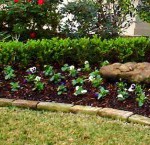Composting is a great way to put to use garden refuse like grass cuttings, tree and hedge trimmings, leaves and withered flowers. Mulch and compost contain a number of valuable raw materials that supply your garden soil with important nutrients in a completely natural way. Here are a few composting tips to recycle your garden waste into homemade fertilizer.
How to Make Compost:
- Gather a combination of nitrogenous (‘green’) and carbonaceous (‘brown’) plant trimmings – mixing lawn clippings with woody cuttings, for example.
- Remember compost needs air. Never lay the material in a trench and do not use containers which are closed on all sides.
- Do not place the compost heap on a solid base made of st
one, concrete, etc. The compost needs an ‘earth connection’, so that earthworms and small organisms can penetrate it. - Earthworms are beneficial to your compost heap and are attracted by phlox and elder, for example. Onion skins, chive residues, coffee
grounds, and tea leaves are also favorite foods for earthworms. - Create order in your compost heap. For the bottom layer, pile up coarse shredded material – approximately 8 inches high. On top of this, add mixed, finer materials such as leaves or shredded material.
- Spread lawn clippings thinly to prevent the danger of decay!
- Always cover kitchen waste with soil, as it attracts vermin.
- Avoid totally dry conditions as microorganisms in compost heaps need moisture.
- Do not water the compost excessively.
- Cover up the finished compost heap.
The composting process takes several months, depending on the time of year and the ambient temperature. When the compost has matured it should smell pleasantly of forest soil and fungus
More On How to Compost:
If you put shredded waste on a compost heap, subsequent turning over is not required.
Passing waste material repeatedly through your garden shr
dder provides optimal mixing and aeration. Shredding waste before placing it on the compost heap speeds up decomposition as it increases the surface area open to microbes and decomposition agents.
STIHL power tools will help tidy up your garden. Their innova
tive technology, high reliability and easy handling are the result of years of accumulated technical know-how. The high-quality cutting systems chop up all kinds of garden waste. Unwieldy branches and bushy twigs are quickly chopped up into easy-to-handle plant residue which you can simply dispose of or reuse as a compost base.
Sourced from STIHL